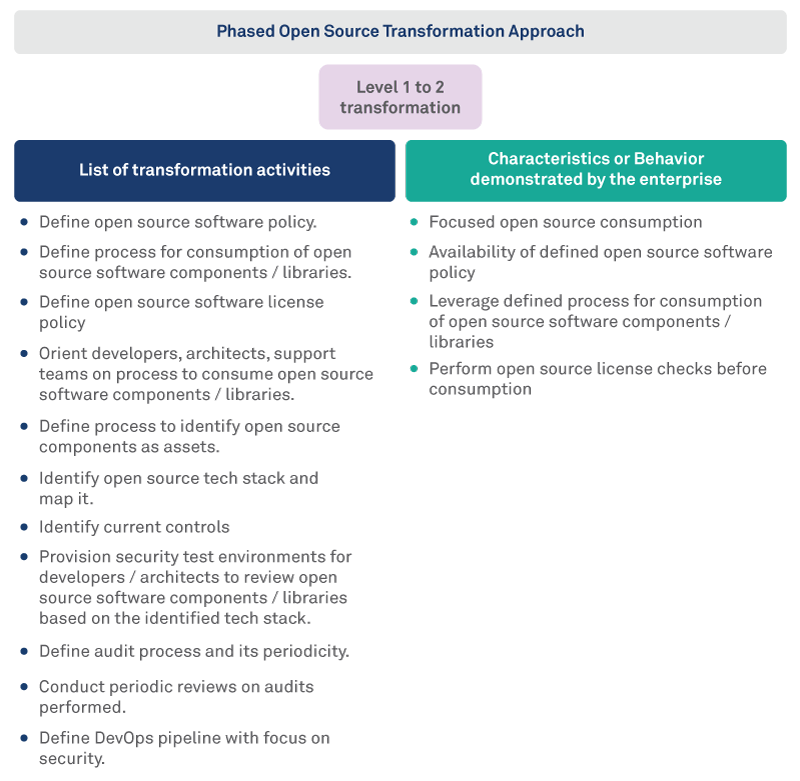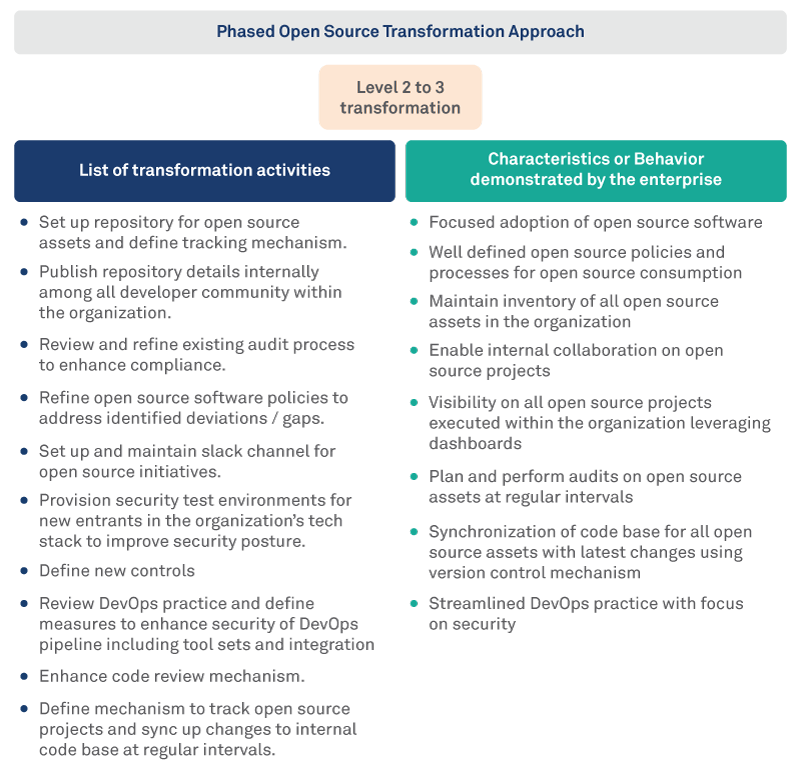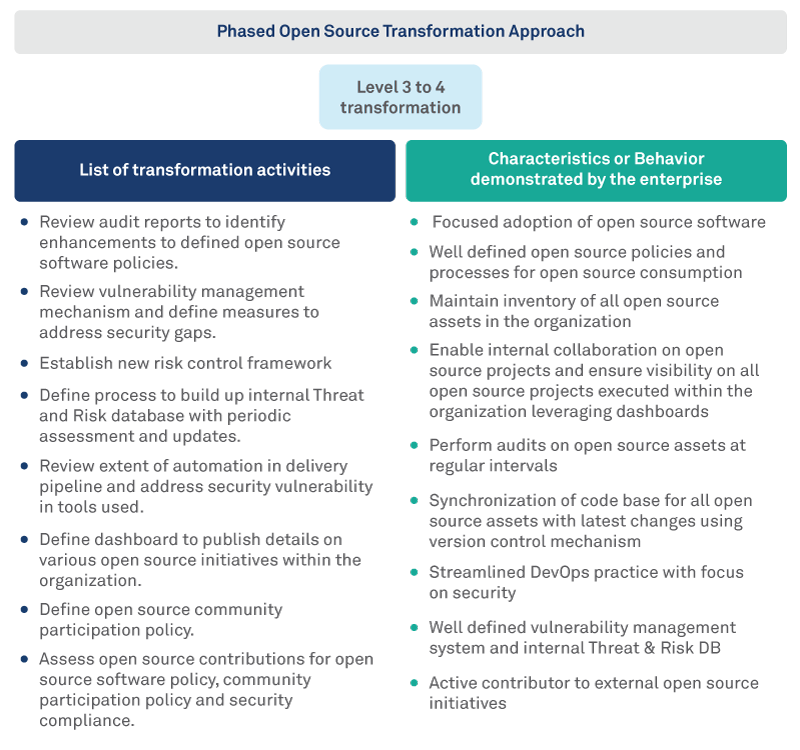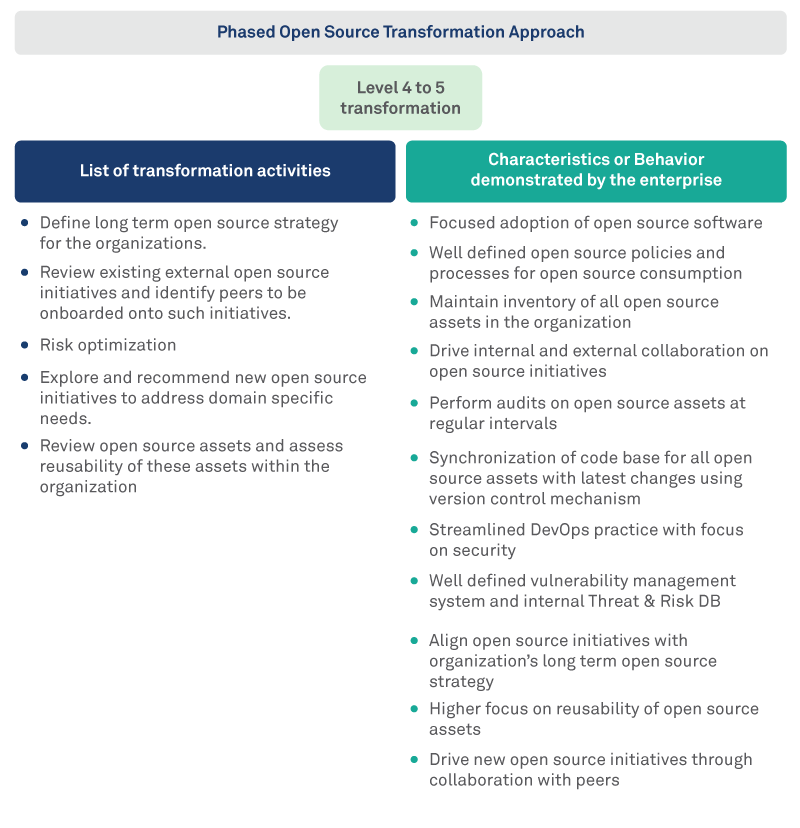Adoption of open source software is on the rise. Enterprises have realized the benefits open source offers, ranging from enhancing quality of applications, flexibility to incorporate application changes without being locked into vendor specific offerings, transparency, community support for technical stacks, and ability to drive business transformation within an organization. However, organizations need to go beyond recognizing these benefits and should evaluate how they can leverage open source software to achieve their business objectives and achieve benefits on long-term basis.
The phased approach to open source transformation
To optimize open source advantages, organizations should start by performing assessment of their internal processes and policies to identify their level of maturity. Wipro’s Open Source Maturity Model is an effective option to enable this.
Once the organization ascertains its open source maturity level, it should then proceed on an open source transformation journey to enhance its maturity level. This is essential for the organization to equip itself with the internal capabilities, policies, and commitment to consume, manage and drive open source community initiatives through collaboration with peers. Focus on security is essential at every stage of this transformation.
As an organization moves from one level to the next level, it undertakes an open source transformation. With the progress to each level, the organization demonstrates the benefits of open source software (OSS) by driving newer open source initiatives, internally helping other departments to collaborate, managing the OSS assets effectively, remaining compliant with defined open source policies, and consuming and contributing open source libraries in a secure manner.
Wipro has devised an open source transformation model to enhance the maturity level of organizations. This is done by leveraging the service offerings from Wipro’s Open Source Security Lab as a Service (O31E) program





Advantages of open source transformation model
Secure and effective transformation
As the pace of digitalization increases, organizations will have to pursue open source transformation journey. They cannot afford to opt out. This is also a strategic initiative that will impact internal processes, policies, management models, and business prioritization.
It is essential that the chosen open source transformation model help organizations assess the deliverables at each stage, build confidence through commitment from all stakeholders without disrupting business, and enable transition in a secure and seamless manner. Wipro’s Open Source Transformation Model provides the management and technical expertise, security thought leadership leveraging Wipro’s O31E program and the agility to help an organization pursue the transformation in an effective and secure manner.
To understand in detail what Wipro can do to support your open source transformation journey, reach out to us at ask.opensource2@wipro.com
Vinod Panicker
Distinguished Member of Technical Staff – Senior Member & Chief Architect – Cybersecurity, Blockchain & Open Source, Wipro
Vinod is a DMTS member and has over 21 years of experience in software development and product architecture. Vinod currently leads the open source and blockchain security initiatives for the cybersecurity practice at Wipro. He is an expert in decentralized identity, blockchain security, building open source solutions, community-led tools development, open-source licensing, and re-engineering of products.
Reza Mortazavi Alavi
Managing Consultant - Risk, Compliance, Assurance - UK/I/CE, Wipro
Reza, with over 15 years of experience in leading technology risk and security executive projects, works with global clients to analyze, develop, and deliver solutions for complex risk and security challenges in digital transformation projects.
Sumod Rajan George PMP
Sr. Project Manager, Cybersecurity and Risk services, Wipro
Sumod has two decades of experience in software development, managing various projects and programs for business domains, such as retail, finance, healthcare, and transportation. He is currently part of the open source and blockchain security team with CRS, which develops solutions around decentralized identity management using blockchain technology and focuses on trustware security.